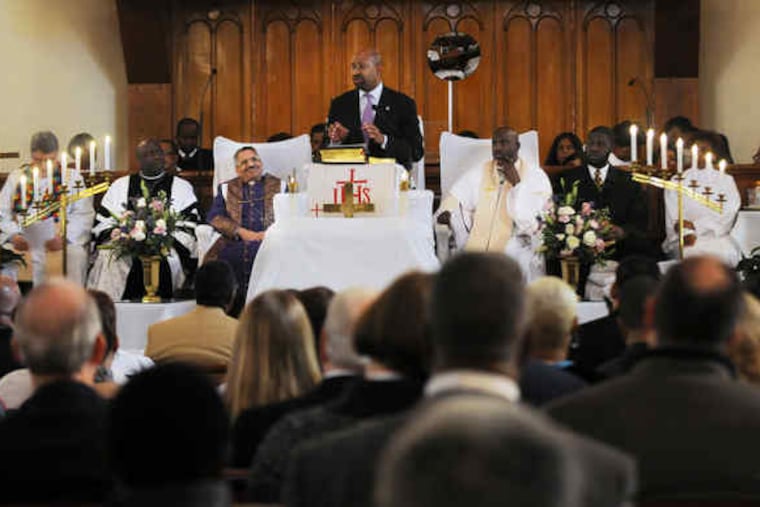250th birthday gift to two congregations
St. George's, Mother Bethel join to celebrate Bishop Allen.

Above the pulpit at Mother Bethel African Methodist Episcopal Church, in gold lettering over the archway, is a motto of the denomination's faith, personified by the life of its founder and first bishop, Richard Allen:
"God our Father, Christ our Redeemer, Man our Brother."
As worshipers filed into the sanctuary yesterday to mark the 250th anniversary of Allen's birth, Ruby Boyd, 91, reflected on just how far those words had taken the congregation.
For the first time, members of St. George's United Methodist Church in Old City - the church Allen walked out of more than 200 years ago because African Americans were segregated in a balcony for services - visited Mother Bethel to join the congregation in Sunday morning worship.
"I think it's a wonderful, wonderful thing," said Boyd, a retired librarian, wearing a pale yellow jacket over a black dress, her silver hair in loose curls. "But I'm so sorry it look so long."
When first-time visitors were asked to stand yesterday, a dozen members of St. George's stood with them.
In October, 300 Mother Bethel worshipers had joined services at St. George's in the spirit of reconciliation.
"It's like we've come full circle," said Alice Menyweather, 65, of Olney. "It's kind of choking to see where we've come from as a church. And now, we're together. It just gives me goose bumps."
Yesterday's service was filled with testimonies of history, faith, pride, and determination. As sun brightened the colorful stained glass, the church steward led the congregation in prayer. The choir clapped and swayed to the hymn "Oh Happy Day." Praise dancers moved down the aisles. Mayor Nutter gave a special greeting.
"Bishop Allen believed God is God all the time, and God is God of everyone," Nutter said to applause. "Philadelphia - and I would suggest our nation - is a better place because of the pioneering work of Bishop Allen."
In addition to Allen's accomplishments, Nutter spoke of how African Americans' history has gone from "picking cotton to the White House picking roses."
"Thank you, Bishop Allen," Nutter said, "for walking out of church, so that I may walk into the mayor's office. You secured my freedom, and the freedom of many others, when you secured your own. For that, we should all be grateful."
Ruby Boyd's parents, Bersie and Pearl Chappelle, who moved to Philadelphia from South Carolina, joined Mother Bethel shortly after Boyd was born in 1919.
For years, her mother, whose father was an A.M.E. preacher, served as superintendent of the Sunday school. Boyd's father, who stoked fires at a North Philadelphia wood factory, was secretary of the board of trustees.
"In that day, no one never would have thought that the African Methodist Episcopal Church would have spread around the world," Boyd said.
Allen, father of the denomination, was born in 1760, a slave on the plantation of prominent lawyer Benjamin Chew. When he was 7, Allen's family was sold to Stokely Sturgis, a wealthy plantation owner near Dover, Del.
Slavery would later separate Allen from his father, mother, and younger siblings - all sold away.
When Allen was 20, he bought his freedom for $2,000.
He went on to organize the Free African Society, a self-help group. He operated a station on the Underground Railroad and spoke out against slavery and racial inequality. He founded schools for African American children. And in perhaps his boldest act, in 1791, after walking out of St. George's, he founded Mother Bethel, sparking the A.M.E. movement.
Today, the church at Sixth and Lombard Streets is billed as the oldest parcel of land continuously owned by African Americans. The denomination, which has roots in the Methodist church and an episcopal form of church government, has three million worshipers and about 6,200 churches worldwide, according to Mother Bethel's pastor, the Rev. Mark K. Tyler.
After the offertory of yesterday's service, Bishop Richard Franklin Norris Sr., presiding bishop of the denomination's first district, delivered the sermon. He quoted the New Testament, the second chapter of 1 Peter, about "disallowed stones that get their rightful place."
"You got to watch out for what you stand for, and what you stand on," Norris said in a robe of deep purple and white. "People get mixed up about what drives their belief system, and what stabilizes them in life."
He spoke of Allen's legacy as "founder of our doctrine and our discipline."
"Richard Allen understood the importance of being who he was, and staying connected to Jesus Christ. There is no other foundation. That is Richard Allen's influence, and that influence still lives on."
At the service's end, the Bishop Allen Candle was lit by one of Allen's descendants, and a wreath was laid at his tomb in the church basement.